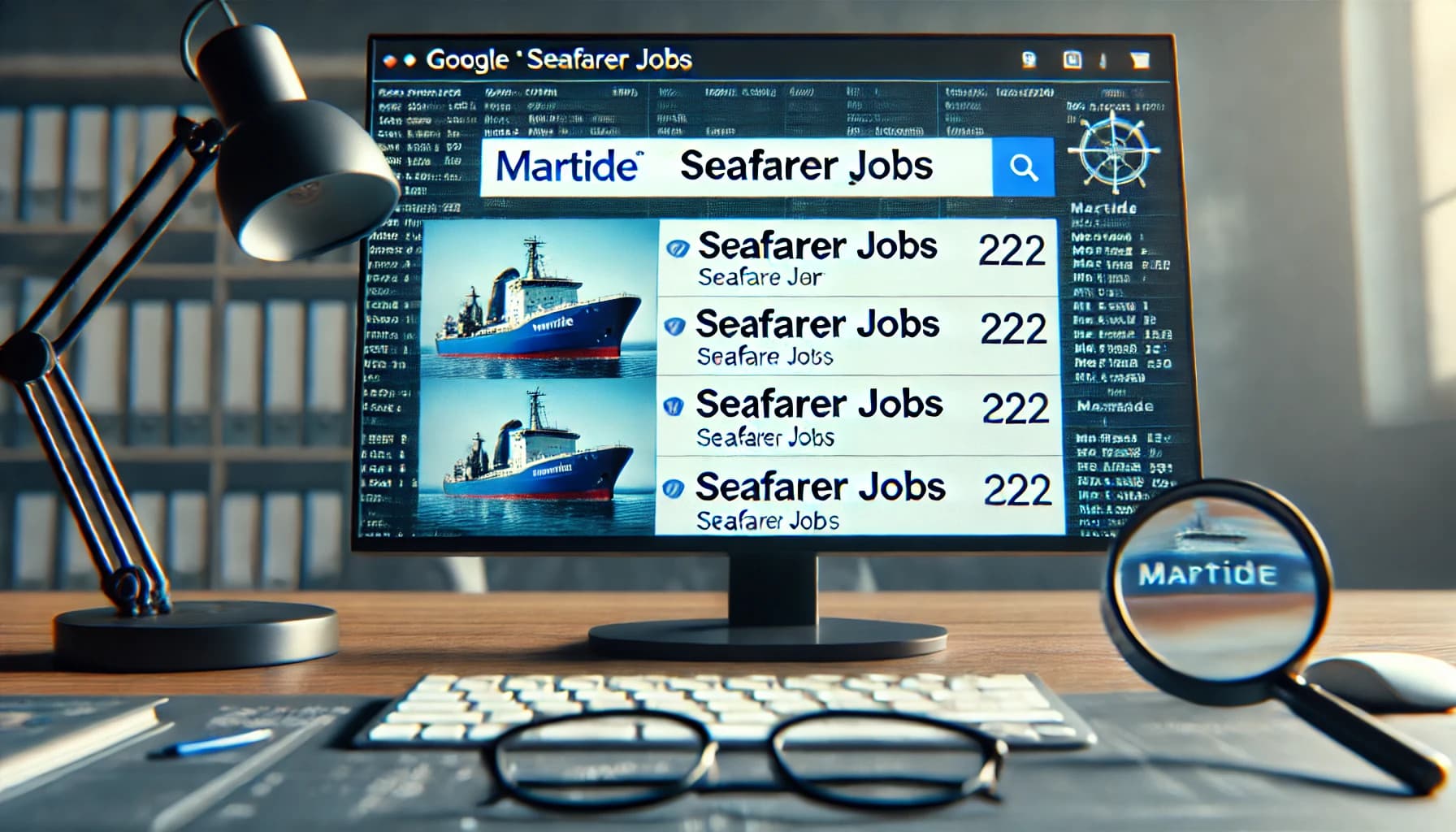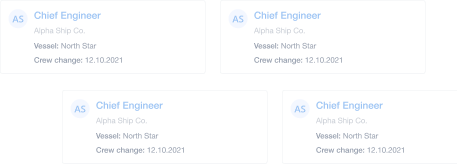How to Write Eye-Catching Maritime Recruitment Job Ads
Feb 28, 2020 · 14 mins read ·
Maritime Recruitment
If you’re a shipowner or ship manager at a small to medium sized shipping company, have you ever wondered how to attract more candidates to your organization to grow your candidate database and boost your maritime recruitment drive to fill seafarer jobs more quickly?
Filling vacant positions can be difficult in many sectors but in the maritime industry with its constant turnover of contracts and crew retention issues, it can sometimes feel like a never ending uphill struggle.
That’s why you should make sure that the job adverts you post are, well, doing their job!
You need to write ads that tell seafarers who are looking for a new contract what your vacancy is, when it starts, and the specifications of your vessel. But - and of course there’s always a but - you need to make them eye-catching and persuasive so that new recruits are motivated enough to apply.
How do you do that? We’re going to tell you - so carry on reading!
First you need to know your audience
The first thing you need to take into account when you’re reaching out to a group of people with the aim of attracting their attention is who you’re actually talking to.
In other words you need to know your audience.
This is one of the first stepping stones in any marketing campaign and it’s just as relevant to your job adverts and maritime recruitment drive.

Read more: This Martide Feature Helps Your Grow Your Candidate Database
After all, you’re marketing your company, brand, and jobs to seamen who are looking for a contract - and who probably have more than one employer to choose from.
So how do you get them to be a part of your candidate database, and not your competitors?
Know your audience when writing job adverts
Of course, if you’re advertising vacant seafarer jobs, you’re looking to attract seafarers.
Makes sense, right?
But chances are you will be targeting different seafarer ranks. If you’re looking to fill Chief Officer jobs you’re probably looking for an older recruit with deep experience in the maritime industry.
Meanwhile your Deck Cadets are going to be younger, less experienced, and looking for entry level cargo ship jobs.
So, do you write two different types of job adverts depending on the rank? Or do you create a job advert template that can be used to advertise all of your vacancies?

The choice is yours and it could well depend on where you’re advertising.
For example, if you’re placing an advert for a ship’s master in a printed magazine, you will probably want to make sure it’s individually worded and speaks directly to a seaman with that level of experience.
If you’re placing your ads on a mariners’ job board or website, or if you’re using social media to fill your vacancies, you might want to use a template.
That way you’ll save yourself time while also ensuring your brand message and image is consistent. You can go into more detail and personalize the information at the next stage of the maritime recruitment process.
More on that a little later!
The point is, even if you’re using a templated job advert approach, you still need to know who you’re talking to. In this case job seekers in the maritime industry.
It doesn’t matter if they’re a Master or a Junior Engineer, the likelihood is, your potential candidates will be looking for their next contract on their smartphone.
They could be anywhere in the world and it’s possible that they’re busy, either at sea or enjoying shore leave, and don’t have the time (or the inclination) to sit down and read a lengthy, wordy job advert.

Keep in mind there may be language barriers too.
Even though English is the working language of the maritime industry, you still want to make sure that all of your potential recruits can read and understand exactly what your job is and what you’re offering.
How maritime recruitment is changing
While using a manning agent is still a popular choice in the shipping industry and some shipping companies swear that going to job fairs helps them find recruits, the fact is the up and coming generation of seafarers are approaching finding work in a very different way to the candidates and hires who have gone before them.
Millennials (those born between 1981 and 1996) and Generation Z (born between 1997 and 2012) are a lot more digitally switched on compared to previous age demographics. That means they’re looking for seafarer jobs and contracts using their smartphones and mobile apps.
And that means if you’re posting your job ads online, you need to make sure they display correctly and are easy to read on a smaller screen.
Regardless of your personal opinion on ‘the youth of today’ the point is, you may need to change your methods if you want to attract younger, more technologically-able seafarers to your candidate database.
The shipping industry, its jobs, and maritime recruitment are changing and so too are the people you hire.
Employing those who know how to operate the myriad of new complex technologies that crew on board are now having to learn to operate, maintain, troubleshoot or repair is now more vital than ever before.

Next let’s take a look at how to write a job advert template that works equally well for your, perhaps, more traditionally-minded masters and chief officers as it does for your tech savvy deck cadets who are looking for entry level cargo ship jobs.
8 Things to do when writing a job advert template
There are a lot of seafarer jobs out there which is why a lot of shipping companies choose to outsource their hiring processes to a specialist recruitment agency - like Martide.
But if you are doing your own advertising, you need your ads to get noticed whether you’re posting them on your own website, on maritime job boards or on your social media accounts.
Follow these 8 steps for a greater chance of ensuring your ads are the ones attracting all the attention. (In the right way!)
1. The job title
It goes without saying that this is the most important part of your job advert. Make sure your position, rank or role is clearly stated at the top of the advert.
2. The names of your company and vessel
While job ads in many industries will then include a blurb about what makes their company so great to work for, the maritime industry is a little different.
Seafarers are looking for their next contract. They know the specifics of their rank and what their job is likely to entail. That’s why we suggest getting straight to the nitty gritty with your company’s name and the vessel you are recruiting for.

3. The change over date
Again, you can say goodbye to information about your company, your culture and your clients. The thing that is crucial here is to make sure seafarers know when you need them.
Your change over date means everything when it comes to successfully and safely manning your vessels. You need seafarers to apply if the change over date works for them.
And what you don’t need is to be wasting your time by having to sort through endless applications that aren’t suitable because the dates don’t align.
4. The vessel’s trading area
This is the equivalent of a shore based job telling potential candidates where their office is! Your recruits will probably want to know the trading area of the ship. Plus to make your life easier, you’ll want to attract seafarers who have the correct documentation and visas already in place.
5. The vessel’s specifics
Again, you need to be attracting the right people for the vessel. It cuts down on wasted time during the recruitment process, improves candidate experience (which in turn leads to better crew retention), and helps ensure you find seafarers with the relevant experience for the job. That means listing everything from the ECDIS to the engine to the DWT.
6. The contract length
While shore based jobs in any industry will normally hope to retain a great candidate for many years, your contract has a shelf life. Of course, it would be ideal to be able to line up the same awesome seamen for your contracts again and again, but they do need to take shore leave between jobs.

And knowing whether they’re probably going to be at sea on a four or six month contract, or for longer, is something almost every candidate is going to want to know.
7. Any other useful information
If there’s anything else you want potential candidates to know, this is your chance. Perhaps you want to add in types of documents needed, specialist areas such as experience with cranes or LNG fuel, how much experience you need a recruit to have, contract variance, or the size of your fleet.
8. Call to Action
Your Call to Action or CTA, in marketing speak, is the part where you call upon the person reading your job advert to act upon what they’ve just read.
In your case, you will probably want them to apply for your job!
To increase the chances of that happening, make it clear what they need to do next. Your advert might have a big “Apply Now” button for them to click on, or you may include a link, or contact details. But however you want to ask candidates to get in touch with you, make it obvious and as easy as possible for them!
Finally, one thing to bear in mind when you’re writing adverts for jobs is that:
Job adverts and job descriptions aren't the same
In the maritime industry, this isn’t so much of an issue if you’re recruiting for seafarer jobs, but it’s worth bearing in mind if you’re writing job adverts for shore based employees: don’t make the mistake of thinking that a job advert is the same thing as a job description.

Obviously if you’re looking for an Able Seaman, Chief Engineer, Wiper or Oiler simply stating the rank is adequate as your candidates will know what their job entails and what is expected of them.
Plus, if you use Martide, our platform will let you take care of all the little, nitty gritty details as you move throughout the recruitment process.
If, however, you’re writing an ad for a Crew Operator or Recruitment Officer to work in your office, you’ll need to cover the basics. But leave the detailed explanation of the responsibilities and tasks of the position until the second part of your recruitment process as this can be gone over in detail once you have received an application.
And when it does come to the part of your process where you might need to negotiate with, or sell your company to, a seafarer - particularly those in the Millennial or Gen Z age brackets, be aware that simply finding a job or signing a contract is often not enough.
Salaries need to be competitive, benefits are often seen as important as pay - for example, paid sick leave, and perks such as a gym and/or WiFi onboard are rated highly.
How Martide can help you grow your candidate database
If all of this sounds like a little too much trouble, you’re in luck as Martide takes the hassle out of writing, posting and promoting job adverts through our easy-to-use online maritime recruitment platform and crewing software.
We also make taking care of all the follow up steps during your recruitment process a piece of cake with our streamlined Applicant Tracking and Crewing System.
Create an account with Martide today and not only will we make sure your job adverts are seen by our community of seafarers across our website, mobile app for seamen and social media accounts such as Facebook, Twitter and LinkedIn, but you’ll also have instant access to our candidate database - or as we call it, our global talent pool too.
That means you no longer have to wait for applicants to come to you - you can reach out to them if you think their experience and qualifications match your requirements.
Want to find out more? Get in touch with us now to schedule your free no-strings attached demo!
Read the previous article in this series: The Ultimate Guide to Growing Your Maritime Candidate Database
Read the next article in this series: How to Use Social Media to Up Your Maritime Recruitment Game

Eve Church
Eve is Martide's content writer, publishing regular posts on everything from our maritime recruitment and crew planning software to life at sea. Eve has been writing professionally for more than two decades, crafting everything from SEO-focused blog posts and website landing pages to magazine articles and corporate whitepapers.
UK



